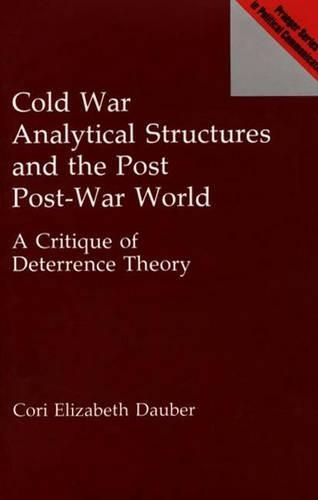
Cold War Analytical Structures and the Post Post-War World: A Critique of Deterrence Theory
(Hardback)
Publishing Details
Cold War Analytical Structures and the Post Post-War World: A Critique of Deterrence Theory
By (Author) Cori E. Dauber
Bloomsbury Publishing PLC
Praeger Publishers Inc
22nd February 1993
United States
Classifications
Tertiary Education
Non Fiction
Nuclear weapons
International relations
355.02
Physical Properties
Hardback
224
Description
Cori Dauber examines deterrence theory at a structural level, which allows a focus on the similarities between the major perspectives on nuclear strategic doctrine. By examining such issues as validity standards and the evaluation of evidence, Dauber aims to assess deterrence as a theory of persuasion, and to examine the way deterrence discourse so shapes the thinking policy makers and analysts that it still drives our analysis of alternatives, even in the post-Soviet era. Dauber concludes that deterrence is a system designed to use weapons capabilities as a form of non-verbal communication with an Other - for the last 40 years, the Soviet Other. Understanding these rhetorical structures and the way they function is essential in predicting the restrictions that deterrence places on the way the United States responds to foreign nations. "Cold War Analytical Structures and the Post Post-War World" is designed as a model for scholars in argument and persuasion to apply their methods to real world situations.
Reviews
Of most interest to scholars of communication theory and strategic perception and psychology.-Choice
"Of most interest to scholars of communication theory and strategic perception and psychology."-Choice
Author Bio
CORI ELIZABETH DAUBER is Assistant Professor of Speech Communication and Director of Forensics at the University of North Carolina, Chapel Hill, where she is a member of the Curriculum on Peace, War, and Defense. She has worked primarily in the area of argument studies and the rhetoric of defense, and has published articles in Defense Analysis, Political Communication and Persuasion, and the Journal of the American Forensic Association.
